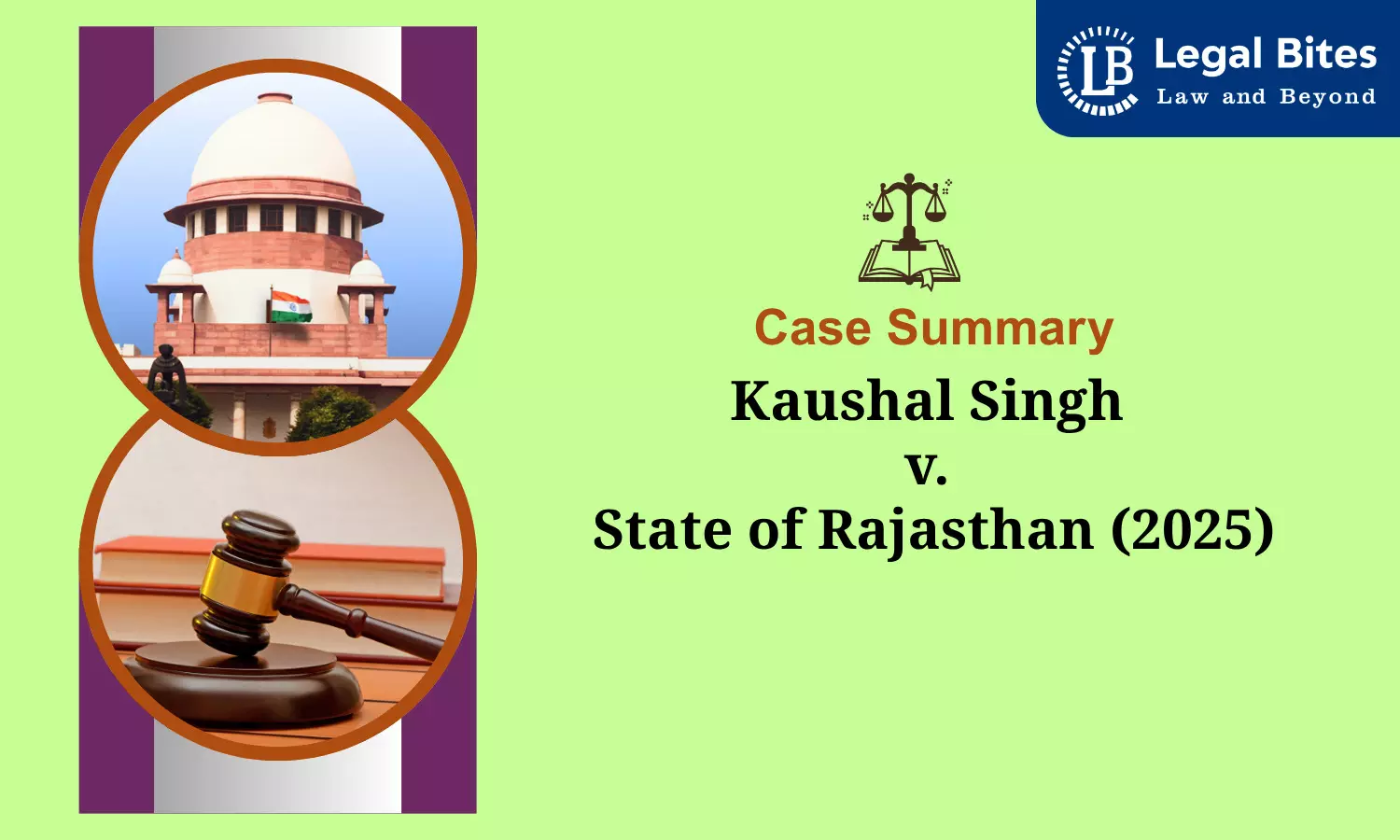Case Summary: Kaushal Singh v. State of Rajasthan (2025) | Supreme Court on Disclosure of Criminal Antecedents in Bail Pleas
This Supreme Court judgment highlights the delicate balance between judicial accountability and the independence of the judiciary. Read on for details.

In Kaushal Singh v. State of Rajasthan (2025), the Supreme Court addressed an important question regarding the propriety of High Courts passing adverse remarks against members of the subordinate judiciary while exercising judicial review in bail matters. The appellant, a judicial officer, challenged the observations made against him by the Rajasthan High Court regarding his decision to grant bail to an accused. The Apex Court set aside the strictures and underscored the need for higher...
In Kaushal Singh v. State of Rajasthan (2025), the Supreme Court addressed an important question regarding the propriety of High Courts passing adverse remarks against members of the subordinate judiciary while exercising judicial review in bail matters. The appellant, a judicial officer, challenged the observations made against him by the Rajasthan High Court regarding his decision to grant bail to an accused. The Apex Court set aside the strictures and underscored the need for higher courts to exercise restraint while criticising subordinate judges, especially without allowing them to be heard.
Background of the Case
Title of the Case: Kaushal Singh v. State of Rajasthan
Court: Supreme Court of India
Citation: Arising out of SLP (Crl.) No (s). 2254 of 2025
Appellant: Kaushal Singh, a Judicial Officer in the District Judge Cadre of the Rajasthan Judicial Services.
Respondent: State of Rajasthan.
Judges: Vikram Nath (J), Sanjay Karol (J) & Sandeep Mehta (J)
Date of Judgment: July 18, 2025
Chronology of Events
- FIR No. 224/2022 was registered on 23 October 2022 at Police Station Gegal, District Ajmer, under various sections of IPC including 147, 323, 341, 325, 307, and 427 read with Section 149 IPC.
- The accused persons included Sethu @ Haddi and Sethu @ Angrej. They were arrested in November 2022.
- On 16 December 2022, the Rajasthan High Court granted bail to Sethu @ Haddi on the ground that the lethal injury was not attributable to him.
- On 19 December 2022, the bail application for Sethu @ Angrej was heard by the appellant, who was acting as a Link Officer in the Sessions Court. He granted bail, applying the principle of parity based on the earlier High Court decision.
- A cancellation application under Section 439(2) CrPC was later filed and bail was cancelled by the Sessions Judge on 6 July 2023.
- The accused then moved the High Court for bail again, which was dismissed by a Single Judge on 3 May 2024. However, in the order, strictures were passed against the appellant-judicial officer for “grossly inappropriate and cavalier” conduct in granting bail.
- The appellant filed a Special Leave Petition before the Supreme Court to challenge the adverse remarks.
Issues
- Whether a High Court is justified in passing adverse remarks against a subordinate judicial officer in a judicial order without affording the officer an opportunity to be heard.
- Whether such remarks amount to a violation of natural justice and administrative propriety.
- Whether the High Court erred in relying on a precedent that had already been overruled by the Supreme Court.
Arguments
Appellant’s Arguments
- The remarks passed by the High Court damaged the appellant’s reputation and career prospects.
- He was neither issued a notice nor provided an opportunity to clarify his position before the adverse observations were recorded.
- The basis of the High Court's criticism, Jugal v. State of Rajasthan (2020), had been overturned by the Supreme Court in Ayub Khan v. State of Rajasthan (2024).
- The appellant exercised judicial discretion in granting bail and based his decision on parity with the co-accused who had already been granted bail by the High Court.
Respondent’s Position
- The State justified the High Court’s observations, arguing that the appellant had erred by not considering the criminal antecedents of the accused Sethu @ Angrej.
- The accused had been identified as the principal assailant who inflicted lethal injuries.
Supreme Court's Analysis
A. Judicial Restraint and Natural Justice
The Court reiterated the principles laid down in In Re: K, A Judicial Officer (2001) and Sonu Agnihotri v. Chandra Shekhar (2024) regarding the restraint higher courts must exercise when commenting on subordinate judiciary.
"Pardon the error but not its repetition."
The Court highlighted five key dangers in passing such judicial remarks:
- The judicial officer is condemned unheard, violating natural justice.
- The public nature of such observations irreparably harms reputation.
- It emboldens litigants and undermines judicial authority.
- It embarrasses the judicial officer, especially if he must appeal or clarify through counsel.
- A single lapse might destroy a career of an otherwise diligent judge.
B. Precedent Overruled
The foundation of the High Court’s criticism—the Jugal case—had been reversed in Ayub Khan v. State of Rajasthan (2024 SCC OnLine SC 3763), making the High Court’s reliance legally untenable.
C. Expunging the Remarks
The Court held that the High Court should not have passed any adverse remarks or directed the transmission of its order to the Chief Justice without:
- Notifying the appellant,
- Giving an opportunity to be heard,
- Separately proceeding through administrative channels.
Hence, the Court expunged the adverse observations and allowed the appeal.
Broader Directions and Observations
Uniform Bail Application Disclosure Norms
The Court took the opportunity to highlight procedural inconsistencies across jurisdictions concerning disclosures in bail applications.
Citing Rule 5 of Chapter 1-A(b), Volume-V of the Rules and Orders of the Punjab and Haryana High Court:
“The petitioner/applicant shall also mention whether he/she is/was involved in any other criminal case or not. If yes, particulars and decisions thereof.”
The Bench recommended that all High Courts consider adopting such a rule to promote uniformity and judicial diligence.
Operative Part of the Judgment
- Appeal Allowed: The Court allowed the appeal and modified the High Court’s order to the extent that all adverse observations/strictures against the appellant were expunged.
- Administrative Suggestion: A copy of the order was directed to be sent to the Registrar Generals of all High Courts to consider incorporating similar rules requiring prior criminal case disclosures in bail applications.
- Pending Applications: All connected applications were disposed of.
Significance of the Judgment
1. Judicial Independence and Dignity: The case reaffirms the dignity of the subordinate judiciary and protects them from reputational damage arising from public censures in judicial orders without due process.
2. Restraint and Procedural Fairness: By drawing a clear line between criticism of orders and criticism of judges, the Supreme Court stressed the necessity of restraint, particularly when judges operate under overwhelming workloads and pressure.
3. Administrative v. Judicial Review: It separated the judicial assessment of orders from the administrative conduct of judicial officers, clarifying that conduct issues should ideally be dealt with administratively by the High Court’s Chief Justice.
4. Standardisation of Bail Disclosures: The Supreme Court's recommendation to standardise rules for disclosure of criminal antecedents in bail applications could pave the way for procedural uniformity, enhancing transparency and judicial efficiency.
Conclusion
Kaushal Singh v. State of Rajasthan is not merely about the expunging of adverse remarks—it is a vital commentary on institutional respect, natural justice, and the functioning of the judiciary in a hierarchical structure. The decision affirms the Supreme Court’s sensitivity to the dignity and morale of judicial officers, while also offering systemic solutions to improve bail jurisprudence. It balances the need to critique judicial decisions with the responsibility not to unjustly malign judicial personalities.
Important Link
Law Library: Notes and Study Material for LLB, LLM, Judiciary, and Entrance Exams

Karan Patel
Karan Patel is an alumnus of the prestigious Faculty of Law, Delhi University, with a specialization in Civil Law and Procedural Law. As a dedicated legal scholar, his work focuses on exploring the nuances of civil justice systems and procedural frameworks through in-depth research and writing.
